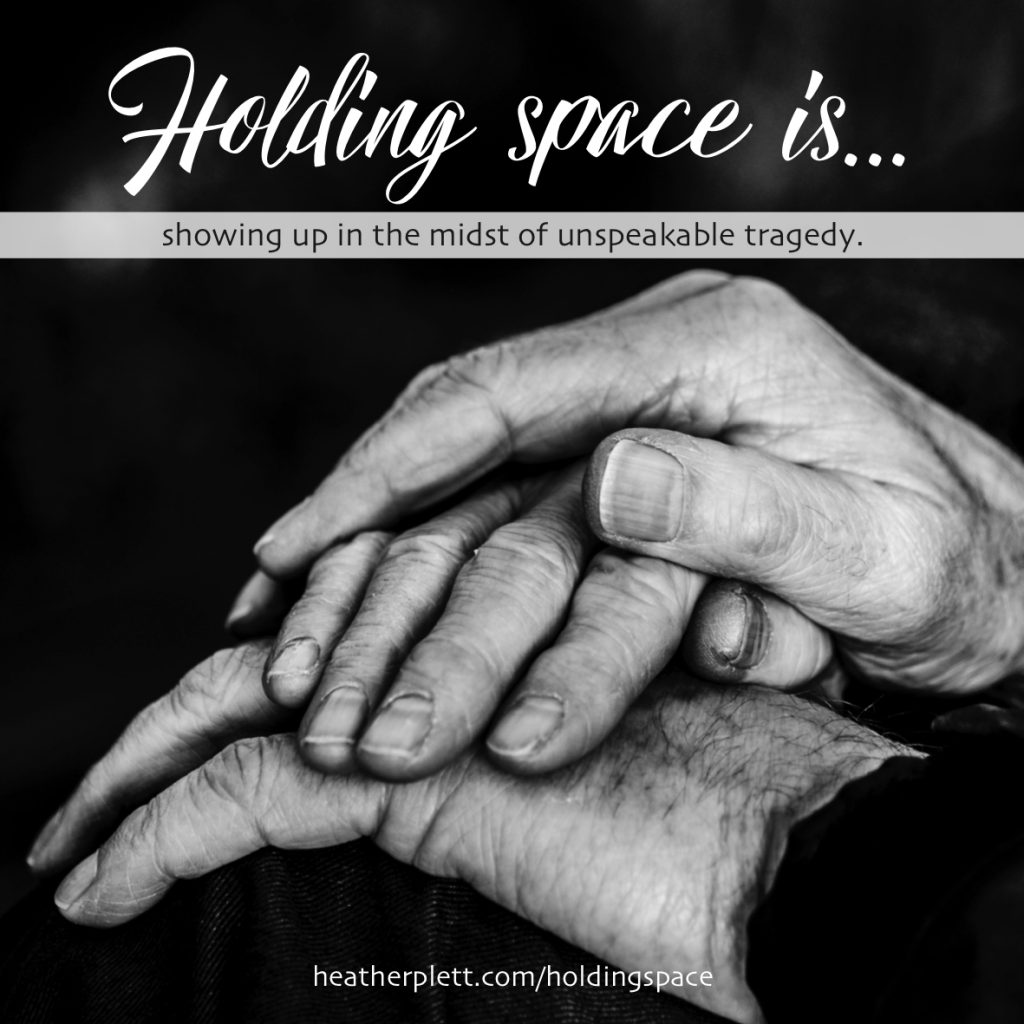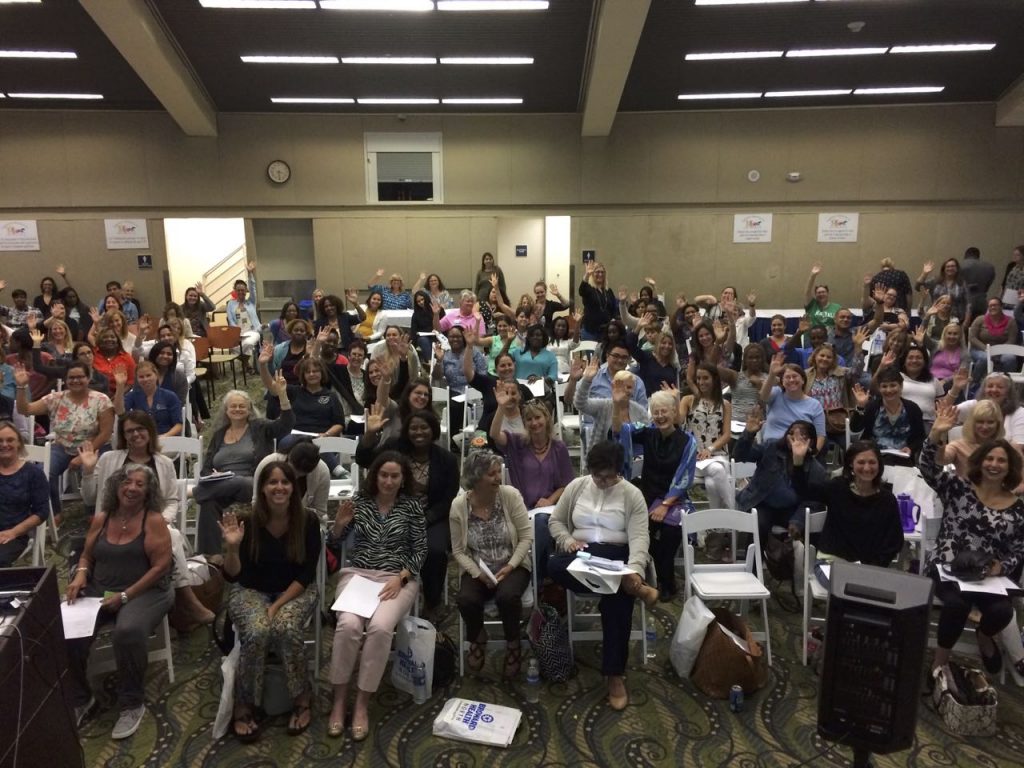Holding space for the unspeakable

In May of 2017, I stood in front of a large group of therapists, school counsellors, and youth workers in Broward County, Florida, teaching a full day workshop on how to hold space for grief and trauma. The next day, I taught many of the same people in two smaller groups how to hold meaningful conversations using The Circle Way.
I almost didn’t make it to Florida. The border guard didn’t understand my work and considered turning me away for not having applied for the appropriate visa. “You’re teaching GREEK?” he asked. “No,” I said, “I’ll be talking about GRIEF.” He looked at me incredulously. Would someone really fly thousands of kilometres to talk about something so depressing? Before he finally approved my entry, he spent an hour deliberating with his supervisor in a back room.
This week, just a twenty minute drive from the auditorium where I taught, seventeen people were killed at Marjory Stoneman Douglas High School. Those very people I spent those two days with will be the ones called on to support youth, families, and community members through it. Some of them might have even been directly or indirectly impacted by the shooting. Either way, they will face what may be the hardest challenge of their lives – holding space for unspeakable tragedy in a community that no longer takes their children’s lives for granted.

workshop participants in Florida
As I sat with that thought, and remembered my time with those beautiful, good-hearted people who spend their lives doing the kind of work that baffles border guards, I wrestled with what kind of support I could offer from so far away. I can’t reasonably stand by their sides or gather them into circles to hold space for their tears and anger. I can’t sit with them when they listen to the anguish of heartbroken high school students, or help them while they support the teachers who will have to carry on after so much loss.
About the only things I can offer them are my love, my encouragement, and my words, hoping against hope that something of meaning will land when they need it most.
This then, is my encouragement for them and for anyone else who finds themselves holding space for unspeakable tragedy. These are not meant to be “thou shalt” words of wisdom, but rather they are gentle whispers to remind you of what you likely intuitively already know.
- Unless they’re doing harm to themselves, don’t get in the way of the emotional release. Those impacted by such horrible tragedy, will need to weep, scream, and rage at the injustice of it all. Let them. None of those emotions are “bad” or “too much”. They need to be released rather than bottled up inside. A person who doesn’t have a healthy release – who’s made to feel guilty for feeling too much – will shut up those big feelings inside and find less healthy ways to release them later. Offer them a safe space to express what they need to.
- Remember that trauma is a physical thing as much as it is emotional. When we block the release of that trauma – by stopping the emotions or shutting down the physical shaking that may occur – it can get stuck in the body and the person may find themselves, years from now, struggling with the debilitating impact of PTSD, addiction, etc.. Help them find healthy somatic (body-centred) ways to release and process the trauma. That may be somatic therapy, and/or it may be more simply engaging youth in physical activities that get them out of their brains and into their bodies. It may also be engaging with alternative therapy programs like equine assisted therapy or art therapy. (Some suggestions: TRE, In an Unspoken Voice: How the Body Releases Trauma and Restores Goodness, by Peter A. Levine, The Body Keeps the Score: Brain, Mind, and Body in the Healing of Trauma, by Bessel Van Der Kolk, When the Body Says No: Exploring the Stress-Disease Connection, by Dr. Gabor Mate, EAGALA)
- Don’t expect them to make too many decisions. A person’s decision making capacity is impaired in the middle of grief and trauma, and even the simplest decisions (what groceries to buy in order to feed their families) can quickly overwhelm them. If you can, simplify things by giving them fewer options (ie. “I’m picking up supper for your family. Unless I hear otherwise from you, I’ll get pizza.”).
- Hold onto your advice or guidance until they ask for it or until you see clear evidence that they’ll be harmed if you don’t step in. When a person is completely overwhelmed by the situation, you may need to step in to give gentle guidance, but otherwise, this is not a time for much advice or guidance. Advice might even contribute to them feeling worse than they did before, because they’ll suddenly feel like they’re not “doing grief right”.
- Don’t try to make sense of it for them. Eventually, their resilience may be built up by meaning-making (ie. finding a purpose in their deceased loved one’s life), but that’s their journey and it will take a lot of time for them to get there. You can be a sounding board for them while they search for the meaning, but offering them that before they’re ready for it may sound like a callous dismissal of their huge loss. Grief first, meaning later. Once they’re ready for it, ask gentle questions that will help them find their own way through to meaning. Don’t prescribe your own meaning to it. (Recommended reading: Man’s Search for Meaning, by Viktor Frankl)
- Remember to care for the caregivers (teachers, principals, custodial staff, parents, community members, etc.) as well as those most directly impacted. While they may not have been directly impacted by the trauma, they might suffer vicarious trauma from having to support those who were. Show them your support in big and little ways (ie. hosting sharing circles, bringing food to their families, giving them days off for self-care, checking in with them weeks after the tragedy, etc.).
- “Comfort in, dump out.” As this wise article suggests, consider who is closest to the centre of the tragedy and make them the priority for care and comfort. Then extend outward, considering who is the next closest to the tragedy, and so on. Wherever you find yourself in the concentric circles, extend comfort inward (to those closer to the tragedy than you) and do your dumping (complaining, crying, raging, etc.) outward to those less affected than you.
- Be prepared for the long-term impacts of the tragedy. A year from now – two, three, ten years from now – this will still reverberate in the community and especially in the school. The children in that high school may still be suffering the effects in adulthood. Be patient and extend grace to people even long after others think they “should” be over it. Check in regularly and offer them a safe space to continue to process and heal. Don’t shame them for taking longer than other people have.
- Help them find rituals for healing and release. There’s a good reason why it is so common for us to gather at funerals after a person’s passing and to lay flowers on a grave years after the death. These are rituals that allow us to honour a person’s memory and express our love for them. Little by little, they heal us. Be creative and supportive in helping those affected to find the rituals that work best for them. It might be to frame their soccer jersey, to memorialize them with a park bench, to plant a tree for them in the backyard, or to throw a party for their closest friends. There is no “right” way to do this.
- Engage in radical self-care for yourself. The emotional labour required for holding space in such intense situations is much more taxing than we often realize. Be radical in how much compassion and care you extend to yourself. In the middle of the crisis, the best you might have time for is eating healthy food and drinking lots of water, but don’t forget to do more once there is more spaciousness. Set clear boundaries to protect the time you need for replenishment and healing. Take a day off work and go to the beach. Go for reiki or a massage. Hire a housecleaner to do the tasks you haven’t had time for. Do not feel guilt for the care you extend to yourself – it is essential. And forgive yourself whenever your imperfection shows.
This may be the hardest time in your life, and there are few words that will make it any easier. But remember that you are not alone. There is love and compassion being extended to you from thousands of miles away. Ask for the help you need and don’t try to do it all alone.
With love from Canada, your friend Heather Plett
******
Looking for more resources on holding space? I’ve gathered a collection here.
